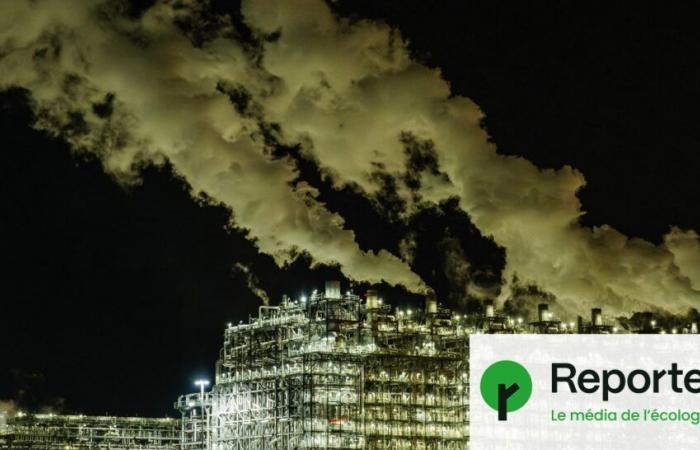175 countries, more than 2,000 negotiators and observers, 7 days of discussions… After Baku and the COP29all attention turns this week to Busan, South Korea. Another crucial summit for the future of our planet is taking place there, one that should lead to an international treaty on plastic pollution.
This fifth session of the Intergovernmental Negotiating Committee (INC-5) should in theory be the last. Over the past two years, United Nations countries have already met in Nairobi, Paris and then Ottawa.
If nothing is done, plastic production will triple by 2060, according toOECD. The Tara Ocean Foundation, which has worked for years to raise awareness among the general public and decision-makers about the scale of the scourge represented by plastic pollution, will be present in Busan. Henri Bourgeois-Costa, its director of public affairs, answered our questions before his departure for South Korea.
Reporterre — Can you remind us of the main issues of this week of negotiations which opens in Busan ?
Henri Bourgeois-Costa — For the moment, we have a draft of the text — a « draft » — from the previous negotiating session in Ottawa. This enormous document includes almost all the possible options since most of the text is not the subject of agreement, and therefore presents quite radically opposed visions between, on the one hand, the countries of the High Ambition coalition. to end plastic pollution [1] and, on the other, the « Like minded countries » (« countries that think the same »), representing oil interests. We are therefore faced with a text which says a bit of everything and its opposite.
The committee's chairman, Luis Vayas Valdivieso, attempted to propose a new path with what he called a « non-paper »that is to say a document in which he tried to synthesize things and lay down the fundamentals of what a text could be. But he did so without any particular mandate. Thus in Busan, discussions will take place either on the official text, or from this « non-paper ». But some States could very well ask that the latter be thrown in the trash, since it is unofficial.
What do you think of this “ non-paper » on the bottom ?
We are a lot ofONGbut not only, to highlight its lack of ambition. The president's idea is obviously to bring people together widely. Except that by trying to collect it too broadly, there isn't much content left. This text essentially deals with waste, recycling, prevention and financial mechanisms. But it does not address at all what is tense, namely the issues of reducing production, the question of toxic substances and even less that of carbon which remains an absolute taboo. Even our minister considered that this text deserved to be greatly enriched.
A consensus seems impossible given the current state of positions.
By nature, there cannot be any. But I don't think we should draw a negative conclusion from this. When there is consensus, either we end up with ambitious texts, but not necessarily applicable in the field because the application is left to the discretion of each individual, or we end up with a binding text, but whose ambition is extremely weak. It is difficult to imagine that states whose economy is 100 % based on oil or almost – I am thinking of the Gulf countries in particular – would sign an ambitious text.
For us, getting all the countries on board is not necessarily an end in itself. The challenge is to involve the countries which are relevant, structuring on the issue of plastic pollution, namely the Western countries which lead to this consumption. And then also China. Even if it is not one of the leading countries, there is still hope because it is a country that transforms plastic, not a country that produces it. The issue is less crucial for it than for an oil state.
As for the United States, they brought us a huge breath of hope just before the elections, with a real change in attitude from the administration and negotiators, and very encouraging speeches. From now on, the future president's proximity to petrochemical interests clearly risks complicating things for us.
What are the topics that stumble today ?
Reduction in production. A recently published Berkeley Lab study models the outcomes of different mitigation options that could be taken in Busan. It clearly shows that a policy focused solely on recycling and improving collection would not bring sufficient results at all. To achieve the goals of the Paris Climate Agreement [limiter la hausse des températures bien en dessous de 2 °C]it estimates that it would be necessary to reduce production by 75 %.
Several economic hypotheses show that 50 % reduction in production would already be entirely possible to achieve, if only because our production has completely exploded. Peru and Rwanda have set a reduction target of 40 % by 2040. They are the only ones who have put forward a numerical element to shake up the discussion a little, in Ottawa. 40 % reduction by 2040 means returning to the production of the year… 2015. We support this proposal, not that it is satisfactory in itself, but it seems to us an interesting starting point discussion.
What do you fear if no agreement is reached? ?
Our great fear is rather that we allow ourselves to be trapped by the temptation of a text at all costs. The United Nations secretariat is giving us somewhat worrying signs of a desire in this direction. However, a treaty won at Busan risks being a little poor, not addressing the problem throughout the chain, from oil extraction to the consumer.
Today, all hypotheses are still on the table: from complete failure and the end of negotiations to a continuation of discussions, with, for example, the launch of a sixth session. Another interesting hypothesis: having a multilateral negotiation outside the UN framework, with countries which would concentrate their efforts on convincing China on a more ambitious text, rather than wasting time with countries which, in any case, will not want to hear anything on the main topics.
legend






